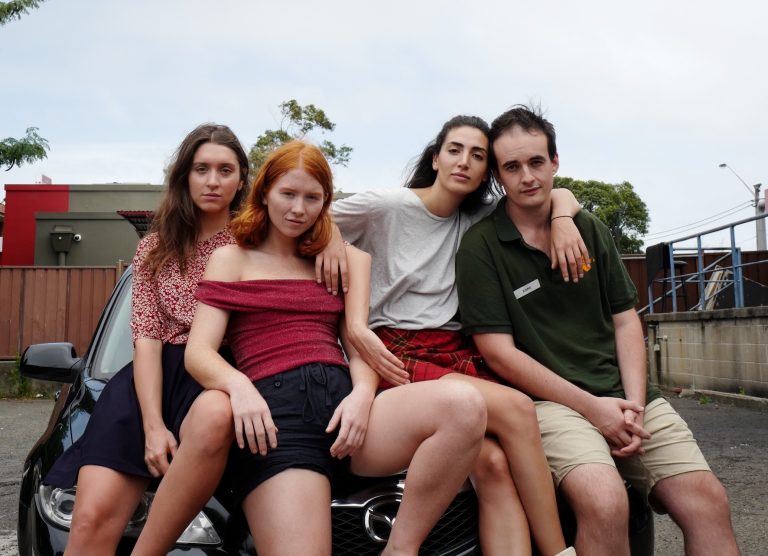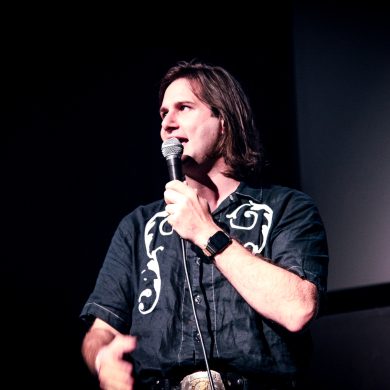When I watched Suburban Wildlife, about half an hour into it I knew that this was exactly my kind of film. It’s a wonderfully written, intimately directed, and superbly acted film that exists thanks to a minuscule budget. I wrote up a review, and just had to reach out to co-writer, director, and producer Imogen McCluskey, and co-writer and producer Béatrice Barbeau-Scurla to find out about what went into making this film.
The Curb: It’s so rare to see a modern ‘coming of age’ story being told in Australia, and in the age of uncertain futures for millennial/Gen Z, how important was it to tell this kind of story now?
Imogen McCluskey: Totally! Bea and I started writing this almost 3 years ago now, and it was born out of a deep love of films such as Muriel’s Wedding and Looking for Alibrandi which really captured a female, Australian coming-of-age experience in the 1990s. But there hasn’t been much since, so Suburban Wildlife was our attempt to fill that gap, and reflected our experiences of reaching adulthood in this hilarious, beautiful and bizarre country.
I’m a fangirl of atmospheric filmmakers like Andrea Arnold, so capturing the passage of time, and the visceral nature of coming-of-age in your body was important to me. It’s a love letter to suburbia and to adolescence, in a lot of ways. The suburbia of hot tarmac, brick houses, and messages scribbled on footpaths. Spending sweaty summers in friend’s pools, joyriding at night through empty streets, and dreaming of being anywhere else. The feeling of being lost and young and scared. Sunburn and stretch-marks and peeling skin and bruised knees. So, rather than focusing on traditional plot-points of a coming-of-age narrative, my aim as the director was to put you in the skin of the characters, and pass on a glimpse of a few hot, sweaty suburban days in their lives.
I think globally, classic coming-of-age narratives have skewed male – with films like Stand By Me, and books like Catcher in the Rye – but there has been a real swell recently to tell stories from a different perspective: female, queer, POC.
Our film is really about 4 characters trying to wrestle with their identity in a point of transition in their lives. There’s a melancholy; a recognition that this phase – their friendship – won’t last forever, but they’re unwilling to acknowledge it, and thus let it go. Hopefully everyone can relate to that.
I think it’s no coincidence that Samuel Van Grinsven’s film Sequin in a Blue Room has come out in the same year: both are films that centre on queer protagonists forming their identity in the modern world, which is really relevant in the expanding conversation around sexuality and gender today.
Béatrice Barbeau-Scurla: The main drive I think for Imogen and I to write Suburban Wildlife was because we felt we didn’t really see a lot of contemporary coming of age stories on screen. Telling stories that represent different ways of living and show familiar landscapes and feelings are always important, particularly for young people. I felt like apart from Looking for Alibrandi, there weren’t a lot of Australian films that showed what it was like to grow up in the suburbs of Australia. With Suburban Wildlife we wanted to focus on the delayed coming of age – I felt like I wasn’t really an adult until a few years after high school, all the American high school graduation movies were wrong. I didn’t feel complete after graduation, and I didn’t know who I was until I got far away from it.
The Curb: There is such a great bond between Nina, Louise, Alice, and Kane, it feels like they’ve known each other for a lifetime. How did you go about creating this bond, and most importantly, how did you go about casting everyone to fit the roles perfectly?
Imogen McCluskey: Thank you! We went through a pretty intensive casting process, as I knew that this bond was super important. You can always clock a fake-friendship on screen, and it is such a well-worn bond between each character that striking that balance was crucial. Often key revelations happen non-verbally, so in a sense they needed to be actors who could sit in the back of the car and look compelling. It was a hard task!
We didn’t have many resources, or really any know-how, so we used free casting platforms like StarNow, and reached out recent graduates from acting schools. All up we auditioned 90 people in the space of a week, and there were certainly times of despair when I thought we weren’t going to find the right fit.
It was such a blessing when each of them – Hannah, Maddy, Priscilla and Alex – walked through the door. Alex King in particular, I almost offered him the role on the spot! From there, we did workshops to test their chemistry (it involved a lot of hugging), and I sent them on ‘dates’ to bond outside of the shoot. They are just such incredible actors themselves, so I can’t take much of the credit!
And honestly, the shoot itself was so intense that it really bonded us all together. We’re all still really great friends now, and often collaborate on each others projects. It formed a great little film family, and I’m so grateful for it!
Béatrice Barbeau-Scurla: The casting was all Imogen, she did a great job as a director helping the actors believe that they’ve been friends for years and you really see it on screen. All the actors are really good friends now which speaks to the casting and the process of shooting the film.


The Curb: One of the aspects I loved about Suburban Wildlife was how open its themes were. Whether it be sexuality, or anxieties about becoming an adult, or the complexities of changing friendships, it made the story feel pulled from real life. How much was from personal experiences and how much was fiction?
Imogen McCluskey: I think almost all of this film is pulled from our lives in some form or another! Bea and I both have a sister, so the character of Phoebe (who was played beautifully by Madeleine Jurd, and named after my real-life sis) and her relationship with Nina was super important to us. It was a real love-letter to our own sisters, and their relationships is something Nina’s character finds solace in at the end of the film.
We wanted to make Nina’s character queer to reflect our own experiences, but the way we wanted to explore it was tied very closely to her exploration of identity. It wasn’t a traditional ‘coming out’, or a major plot point. In reality, her friends have probably known for years! Instead, we spend scenes seeing her borrowing outfits from friends, and that was to show that she’s ‘trying on’ different personas to try and find her fit, and her voice. And also as a way to divert her attention from Louise’s departure, and having to articulate her latent love for her best friend – which she never really finds the strength to do.
I’m really interested in characters that don’t really say the right thing at the right time. I definitely won’t be making a slick Oceans-11 style film any time soon (although if Hollywood comes-a-knockin…!) I find it much more true to life that people stumble, or stay silent, or say the wrong thing. A lot of my work is about a breakdown in communication, and how that manifests between people. Often we explored a lot of their emotions not through dialogue, but through scenes that delved into their dreams and emotions in a heightened, visceral way. There is a sequence when Priscilla’s character Alice, whose parents have been absent her whole life, shares dinner with a family in the bush. This experience is never explained to her friends, but hopefully it gives the audience a glimpse into her longing for connection and stability, which she acknowledges when she reunites with Ravi at the end of the film.
For a film about friendship, they spend a lot of time on their own – so this was very important to us as Suburban is really about the end of their friendship, and suggesting where they are headed out on their own in the next chapter of their lives.
Béatrice Barbeau-Scurla: Everything in Suburban Wildlife was pulled from real life, we had created characters based on ourselves, people we knew, people we used to know… When the actors came on board too, they brought their own experience too and connected with their characters strongly so that definitely helped with the authenticity. The idea of four friends driving around in cars, going to parties, going on road trips was pulled from my early uni days. I was still living in the suburbs and the car was really a symbol of adult freedom, I would drive my friends around, they’d drive me, we wouldn’t really do much but we always enjoyed the company.
The Curb: Suburban Wildlife is as micro-budget a feature as they get. What were the unexpected challenges that you faced working with a small budget, and what did you learn that you can apply to your next feature?
Imogen McCluskey: Oh god…so many! We have so much advice for anyone wanting to head into the micro-budget feature world. It was a blessing and a curse that we really didn’t know what we were getting in for. It was such an enormous undertaking, and I’m so grateful for the incredible talent we had on our film. Truly, we were so lucky to have such a hardworking cast and crew, who didn’t grumble in 45 degree heat (even thought that would be totally fair!) and just wanted to make the best film we could. Especially the talents of Shane Vancuylenberg, our indefatigable sound designer, and Isha Ram Das, our brilliant composer, who really elevated our film in post-production.
In some ways, having a micro-budget was a blessing because we could really make the film we wanted to make, without trying to please any financiers or funding bodies or vested interests. This gave us a lot of freedom, and breath, which was really key to the film I think – and is a lesson that I’ll carry with me throughout my career: the importance of compromise, but not at a cost to truth, and the reason your film exists. Making a feature is a bloody battle, and takes a long time and a lot of energy and dedication – so if it’s not something you’re inspired by, or willing to fight for, then you’re better doing something else. I know I keenly felt the burden of showing the incredible work that went into this film – particularly the performances of the leading actors – and I think their success post-Suburban is testament to their talent.
Béatrice Barbeau-Scurla: Imogen and I always say how lucky we were to be so naïve in thinking it was fine to shoot a feature film with 4000AUD. It was barely enough to pay for food for the crew. We were just lucky we had the team that we did and 99% of the cast and crew were volunteer – that saves you a lot of money. It was definitely the most stressful thing I’ve ever done and the hardest thing I’ve ever done.
The Curb: The crew of Suburban Wildlife is a majority female crew which is unfortunately still a rarity nowadays. How important was this, and what do you feel is the takeaway from working a majority female crew?
Imogen McCluskey: I think things are definitely changing in our industry, but there still needs to be work to be done – particularly with below-the-line crew. Almost all our heads of department were women, and a female-led producing team, so it was at the front of our minds while crewing up. I think a lot of the problem is to do with unconscious bias – if you’ve worked with someone before and have had a good experience, you’re bound to work with them again and recommend them to others. It’s about giving people the foot in the door and facilitating their best work, so they become part of your network. So it’s up to women and men to think about this, and to actively recommend and give chances to people.
Béatrice Barbeau-Scurla: Suburban Wildlife is a female story and having a majority female crew was essential in helping bring to life the authenticity. Although it should be noted that yes, we had majority female crew but mainly we had talented people working with us.


The Curb: What was the collaborative process like when writing the script?
Imogen McCluskey: First off, Bea and I talked at length about what we wanted to see in a film. What we loved about films, what kind of film we wanted to make. There were lots of little key moments and scenes that we wrote down on the first day that ended up in the final film – and it quickly became apparent that we both wanted to make something that was really slice-of-life that really focused on characters, with room for little heightened breaks from reality, where we could lean into the magic of film.
We had quite a tight timeframe to write the script, and the anxiety definitely helped fuel our creativity! I wrote out the dialogue for the opening scene one night when I couldn’t sleep. The banter and pace of the scenes was something we really loved developing. Dialogue is something I really enjoy, and it was great working with Bea to differentiate each character’s journey.
Béatrice Barbeau-Scurla: I came to Imogen with an idea of four friends living in the suburbs not doing much with their lives and she had similar ideas and themes she wanted to explore. We thought we’d challenge ourselves by writing a feature film together. Imogen helped my script make sense, we made more character’s female, gave it a crisis and made it queer. We would write certain scenes and put them together, doing a lot of plotting up top and then sewing it all together. Imogen then did the final pass which really polished the whole idea up. Looking back – I don’t really know how we did it but we did it and I’m really glad we did.
The Curb: An early scene has Louise walking home at night with a guy, and then midway she says that she’s no longer interested in going further. I was terrified that something was going to happen to her, but fortunately, nothing does. I’m thankful that the scene plays out like this. Was there a different version of this scene, and if not, how important was it to include a moment like this in the film?
Imogen McCluskey: Yes! I’m so glad that came across. This was a key scene for Bea and I. We wanted to subtly comment on the fear female-identifying people carry around with them all the time, but without making it a loud plot-point. Instead, it’s a subtle sequence where Louise (played beautifully by Hannah Lehmann) is heading home with a boy, then changes her mind, and instead experiences a glimpse of freedom and melancholy on her own, which is completely sensorial and non-verbal.
It was a really personal scene for me – I’ve been dreaming about someone standing under a bridge as a train passes over for a long time! It’s hard to articulate, but it’s something about the power of being alone: she’s about to head off to London, away from all her friends and begin a new chapter in her life. So filming that was a really satisfying moment for me.
Béatrice Barbeau-Scurla: I think with that scene we wanted to show how scary it is walking home as a woman and most of the time, nothing happens but it’s still a stressful time. We wanted to take scene from real life, I’ve walked home late at night alone so many times and it can be a release.
The Curb: Finally, what lessons have you learned from Suburban Wildlife that you’ll take into your next films?
Imogen McCluskey: Not to make a film for $4,000!!!!! Just kidding.
It was such a tough process – mentally, financially, physically – but I wouldn’t change it for the world. I think it gave all of us – cast and crew – so much confidence moving forward in our work. It’s like we achieved the hardest thing we could, with such little money, and it’s a good film in spite of everything!
No one is going to hand you the opportunity, and particularly today when you can buy or rent a camera very cheaply, there really is no excuse. I’m very proud of everyone, and am so excited by how much we’ve all grown and what we’re onto next. But yes, that is definitely as micro-budget as I’ll ever go.
Béatrice Barbeau-Scurla: Surround yourself with a great team and be passionate about the story you’re telling. Making Suburban Wildlife was hard, but it was a story that Imogen and myself were dying to tell and if we didn’t love the characters, stories and themes we wouldn’t have made it through. The cast and crew have supported us through the whole process, and we wouldn’t have done it without them, they’ve become good friends and collaborators.
To find out more about the film, head over to the Suburban Wildlife website here, or read my review here.




